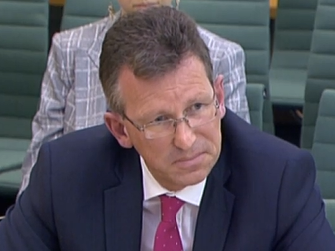
Culture Secretary Jeremy Wright has said a levy on tech giants like Facebook and Google could be used to fund a new internet regulator or pay to educate the public to be “more sceptical about what they read”.
In his first appearance before the Digital, Culture, Media and Sport Committee since taking office in July, Wright said a levy on the likes of Facebook and Google was “something worth considering”
He said: “I personally have not had that conversation with Facebook yet, but… if Facebook says it doesn’t want to pay it that will not be the answer to whether or not we should have one.”
Wright told MPs today it was “undoubtedly true” that Russia had made efforts to interfere with the electoral process in the UK through disinformation campaigns, but said the Government had not seen any evidence this had been successful.
Wright said he advocated better education for the public to know how to recognise such disinformation online.
He said: “There’s no doubt in my mind that attempts [at an information war] have been made and actually it seems to me that what we require here is a national security level response…
“We also need the online companies to be responsible, we need them to be issuing whatever measures they can on the transparency of the messages they are carrying, but we also need frankly a public education response.”
Wright added that after Russia put out “30 or 40” false narratives related to the poisoning in Salisbury of former Russian spy Sergei Skripal, the public needs to “be more sceptical about what they read and see”.
“We can of course try to detect those [false narratives], to identify those, but we also need the public to be conscious of the risk that some of the things they are reading are not true and not just not true accidentally but not true deliberately…
“We need all the help we can give to those reading the material as to where it’s come from, who’s put it up – if you’re talking about electoral material [that’s] even more important of course…”
Wright suggested online companies should help identify where things have come from as well as how authoritative or well-researched a source is “where it’s feasible”.
“All of those things I think we can ask for more help on than we’re currently getting,” he said. “But my sense is that we’ve made some progress in the right direction with the online companies [but] not yet enough.”
Just last week Facebook moved to make political advertising more transparent, forcing buyers in the UK to verify their identity and location, amid concerns over so-called “dark ads”.
Added Wright: “We have to have some quite complex conversations with online companies about what they can do to help us combat this very real challenge.”
Wright also told the committee that a levy on the tech giants could be looked at to fund “a number of things”, including education for the public and an internet regulator “if we consider a regulator is necessary”.
He said: “If we are going to carry out additional activity, whether that’s because of additional regulation or because of additional education for example, then it’s got to be funded somehow.”
He said a levy on tech giants was therefore “something worth considering”.
Asked whether the onus should be on social media platforms to fund solutions to the problems, Wright said: “If we’re still talking about the threat to our democracy, to our national security, by a hostile foreign state then of course there’s a dimension of that where the cost needs to be borne by the taxpayer, because that’s part of the job of the state defending itself.
“If, on the other hand, we’re talking about online harms more broadly, then there is a role for us to think about – for social media companies and other online presences – …how this extra activity should be funded.”
He added that “most of the companies” being discussed have recognised that “the status quo isn’t sufficient”.
Discussing the possibility of establishing an internet regulator, Wright said: “Someone said to me the worst thing you can do in this space is to be the first country that takes on the holistic regulation of the internet if that’s what we decide to do. But I don’t accept that.
“It seems to me that there is considerable merit in the United Kingdom, given the combination of features that I think the UK has, that it takes the lead. I think if global leadership for the UK means anything, it means being prepared to take the first step on issues like this.”
A white paper currently being developed and due for publication before March would set out where the onus should be on online companies to minimise or eliminate harmful content, and what legislation is therefore necessary.
Primary legislation would be required to make substantial changes in the powers of an existing regulator such as Ofcom or establish a new regulator, Wright said.
Picture: Parliament TV
Email pged@pressgazette.co.uk to point out mistakes, provide story tips or send in a letter for publication on our "Letters Page" blog
